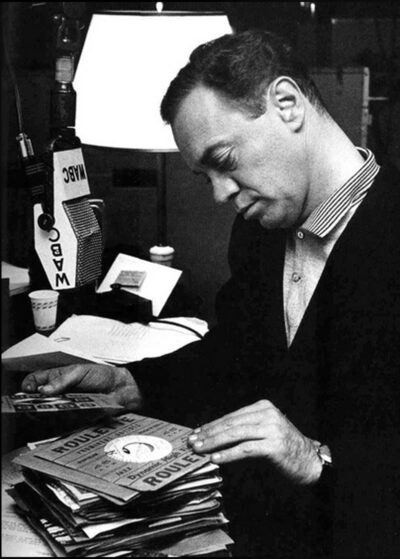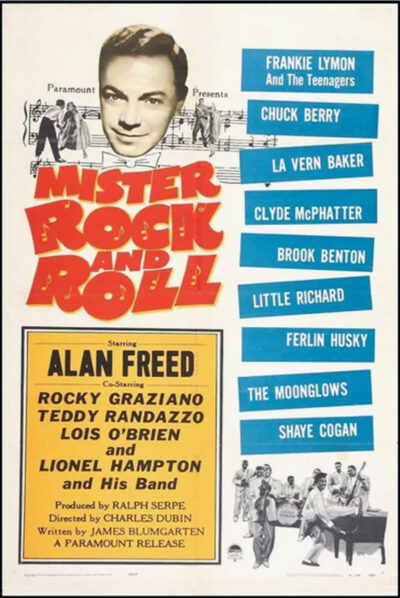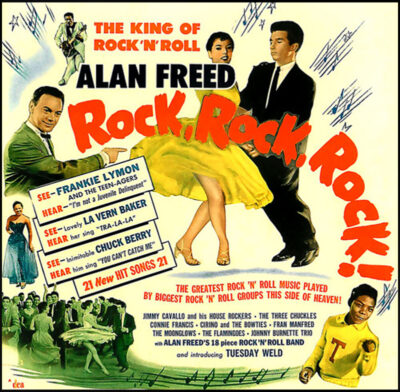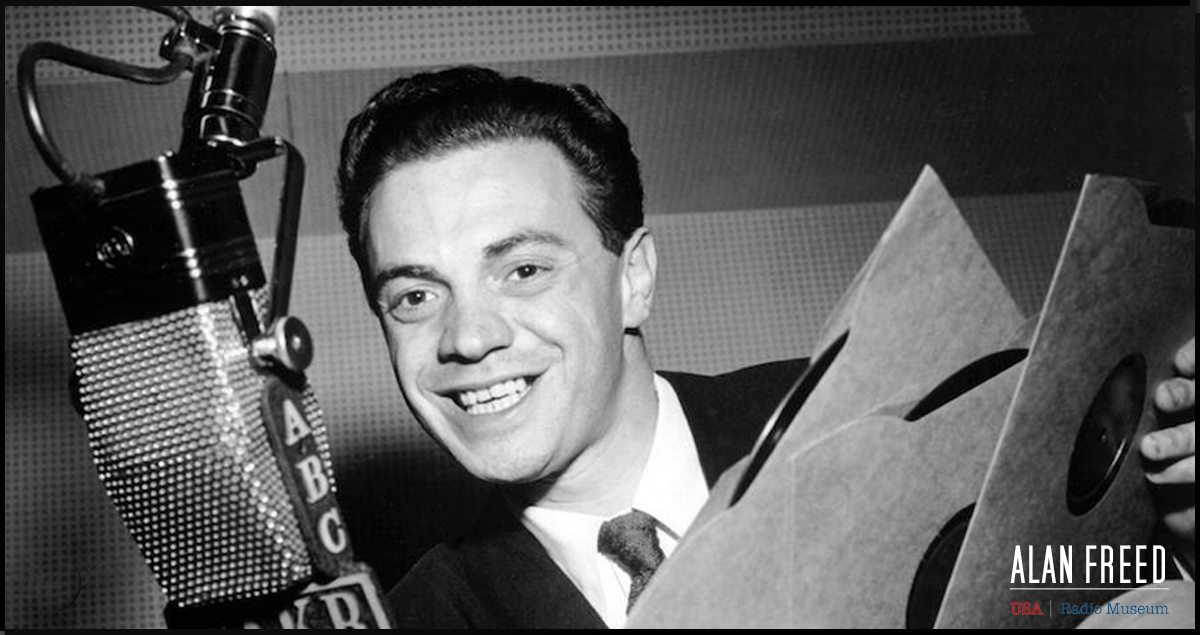Alan Freed: Radio's 'Father of Rock 'n' Roll' and His Enduring Legacy When we think of rock 'n' roll—the genre that broke barriers, united audi
Alan Freed: Radio’s ‘Father of Rock ‘n’ Roll’ and His Enduring Legacy
 When we think of rock ‘n’ roll—the genre that broke barriers, united audiences, and changed the course of music history—one name stands at the forefront: Alan Freed. Known as the “Father of Rock ‘n’ Roll,” Freed was more than just a radio DJ; he was a visionary whose passion for music helped launch a cultural revolution. From his groundbreaking broadcasts to his legendary concerts and controversial downfall, Freed’s story is one of triumph, innovation, and resilience.
When we think of rock ‘n’ roll—the genre that broke barriers, united audiences, and changed the course of music history—one name stands at the forefront: Alan Freed. Known as the “Father of Rock ‘n’ Roll,” Freed was more than just a radio DJ; he was a visionary whose passion for music helped launch a cultural revolution. From his groundbreaking broadcasts to his legendary concerts and controversial downfall, Freed’s story is one of triumph, innovation, and resilience.
Early Days and Rise to Fame
Born Albert James Freed on December 15, 1921, in Windber, Pennsylvania, Alan Freed’s journey into the world of music was shaped by his early love for rhythm and melodies. After an ear infection ended his dream of becoming a bandleader, Freed turned to radio broadcasting—a career that would forever change his life and the music industry.
In the 1940s, Freed honed his craft at smaller radio stations like WKST, WKBN, and WAKR, where his vibrant personality and knack for connecting with audiences made him a local favorite. However, it was his move to WJW in Cleveland in 1951 that marked the beginning of his legacy. Here, Freed coined the term “rock and roll” to describe the electrifying mix of rhythm and blues, jazz, and country music he played on his show, “The Moondog House.” Inspired by street musician Louis T. “Moondog” Harding, Freed adopted the moniker “King of the Moondoggers” and began championing Black artists in a segregated era.
ALAN FREED | WJW-AM CLEVELAND | 1954
Audio Digitally Restored by USA Radio Museum
Cleveland: The Moondog Coronation Ball
Freed’s impact in Cleveland extended beyond the airwaves. In 1952, he organized the Moondog Coronation Ball, considered the first-ever rock ‘n’ roll concert. Hosted at the Cleveland Arena, the concert featured an impressive lineup, including Paul Williams and his Hucklebuckers, Tiny Grimes, and the Dominoes. The event proved so popular that it was oversold, resulting in chaotic scenes as thousands of fans clamored to gain entry. Despite the turbulence, the Moondog Coronation Ball was a turning point in music history, showcasing the genre’s growing appeal and solidifying Freed’s role as a key architect of rock ‘n’ roll.
Breaking Barriers and Shaping a Genre
Freed’s influence extended far beyond his radio broadcasts and concerts. His refusal to conform to the industry’s practice of favoring cover versions by white performers helped elevate Black artists and their original recordings. Artists like Chuck Berry, Big Maybelle, and The Flamingos found a platform in Freed’s shows, reaching audiences that would have been inaccessible otherwise. Through racially integrated concerts and innovative broadcasts, Freed helped bridge cultural divides and foster unity during a deeply segregated era.
New York City: Rock ‘n’ Roll Shows at the Brooklyn Paramount
 Freed’s move to New York City in 1954 marked the next chapter of his groundbreaking career. His “Rock and Roll Party” radio show on WINS was a sensation, introducing millions to the electrifying sounds of artists like The Platters, Frankie Lymon and the Teenagers, and countless others. Freed also organized live rock ‘n’ roll shows at the Brooklyn Paramount Theatre, which became iconic for their energy and diversity.
Freed’s move to New York City in 1954 marked the next chapter of his groundbreaking career. His “Rock and Roll Party” radio show on WINS was a sensation, introducing millions to the electrifying sounds of artists like The Platters, Frankie Lymon and the Teenagers, and countless others. Freed also organized live rock ‘n’ roll shows at the Brooklyn Paramount Theatre, which became iconic for their energy and diversity.
These concerts brought together legendary Black and white artists, performing for integrated audiences—an act of courage and innovation at a time of racial segregation. Freed’s shows celebrated the new sound that was taking over the nation, solidifying rock ‘n’ roll as a cultural phenomenon.
The Payola Scandal and Downfall
Despite his groundbreaking contributions, Freed’s career was marred by controversy. The late 1950s saw the emergence of the payola scandal, a widespread investigation into DJs accepting bribes to play certain records. Freed, who had become one of the most influential figures in broadcasting, found himself at the center of the controversy.
Freed’s refusal to deny the allegations during the hearings set him apart from other DJs who distanced themselves from the practice. This defiance ultimately led to his dismissal from major radio stations and tarnished his reputation. Charged with commercial bribery, Freed faced legal troubles and financial struggles, marking the end of his career. The scandal also prompted stricter regulations in the broadcasting industry, forever changing the landscape of music promotion.
Legacy and Posthumous Recognition
 Alan Freed’s life came to a tragic end on January 20, 1965, when he passed away at the age of 43 in Palm Springs, California, due to cirrhosis of the liver. While his final years were marked by hardship, his legacy as the “Father of Rock ‘n’ Roll” endures.
Alan Freed’s life came to a tragic end on January 20, 1965, when he passed away at the age of 43 in Palm Springs, California, due to cirrhosis of the liver. While his final years were marked by hardship, his legacy as the “Father of Rock ‘n’ Roll” endures.
Freed was posthumously inducted into the Rock & Roll Hall of Fame in its inaugural class of 1986, alongside legends like Elvis Presley and Chuck Berry. Cleveland’s selection as the home of the Hall of Fame is a testament to Freed’s impact on the city’s musical heritage. Exhibits honoring Freed include memorabilia from his career and the Alan Freed Memorial Radio Studio, a broadcast space dedicated to preserving his legacy.
In 1988, Freed was also inducted into the Radio Hall of Fame, acknowledging his pivotal role in shaping the industry. His contributions to music and broadcasting are celebrated as a testament to the power of innovation and the courage to challenge conventions.
Paying Homage to a Visionary
Alan Freed’s story is one of passion, perseverance, and profound impact. He was more than a DJ; he was a pioneer who dared to amplify the voices of Black artists and unite audiences through the universal language of music. His vision for rock ‘n’ roll as a genre that transcended barriers paved the way for future generations of musicians, DJs, and fans.
As we honor the legacy of rock ‘n’ roll, we must celebrate Alan Freed as the visionary who not only named the music that changed the world but also ignited a movement that shattered boundaries and brought people together. His unwavering dedication to amplifying unheard voices and fostering unity through music resonates as powerfully today as it did decades ago. Though his time was cut tragically short, the rhythm he championed endures—pulsing through every chord, every lyric, and every generation inspired by his trailblazing spirit. Alan Freed’s legacy isn’t just remembered—it lives on, echoing in the heart of rock ‘n’ roll forever.
_____________________
A USARM Viewing Tip: On your mobile or tablet device? Finger-tap the above (Alan Freed) images inside the post and stretch image across your device’s screen for LARGEST digitized view.

